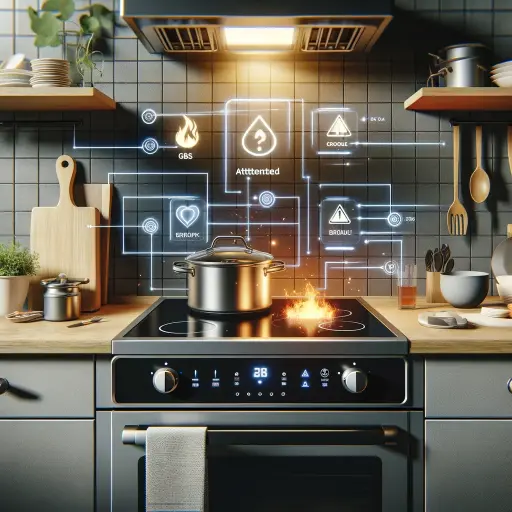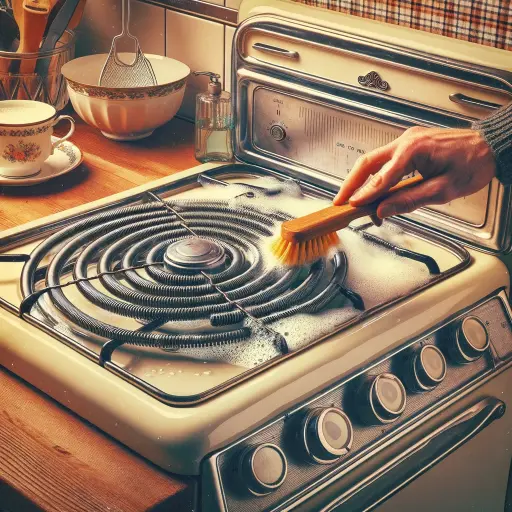Almost 160,000 Kids become causality in kitchen accidents in the United States every year and 35% of home fires start in the kitchen. Electric stoves are generally safe, reliable tools in the kitchen, but occasionally, they can be the source of dangerous electric stove explosions. These incidents often stem from faulty wiring or electrical components that fail. it is important to know the causes of electric stove explosions.

Over time, the elements within an electric stove can degrade, particularly if the stove is old or poorly maintained. This can lead to short circuits or overheating, which, in rare cases, causes sparks or fires that can resemble an explosion.
Understanding these risks is crucial for ensuring the safety of your kitchen. Let find what can cause an electric stove to explode.
Can Electric Stoves Explode?
While it’s extremely rare for electric stoves to explode, it’s not entirely impossible. Electric stoves typically do not use combustible fuels like gas, which significantly reduces the risk of explosion.
However, certain conditions or malfunctions could potentially lead to safety hazards.
The most common safety concerns with electric stoves involve electrical issues, such as faulty wiring, damaged cords, or overheating components. These issues can sometimes result in electrical fires rather than explosions.

However, if a fire were to occur and spread to nearby combustible materials or substances, there could be a risk of an explosion.
To mitigate the risk of accidents or fires, it’s essential to follow safety guidelines provided by the manufacturer, ensure proper installation, and conduct regular maintenance checks on your electric stove.
Additionally, never attempt to repair electrical components yourself unless you are qualified to do so. If you notice any unusual behavior or suspect a malfunction, it’s best to contact a professional technician for insp
Causes of Electric Stove Explosions

Let’s take a closer look at possible causes of electric stove explosions:
- Electrical Overload: When too many devices are connected to the same circuit, it can lead to an overload, potentially causing the stove to malfunction.
- Faulty Wiring: Damaged or incorrectly installed wiring can create an unsafe environment, increasing the risk of an explosion.
- Manufacturing Defects: Occasionally, a stove may have a flaw in its manufacturing process that could lead to a safety hazard.
- Old or Outdated Wiring: If your home’s electrical wiring hasn’t been updated in a long time, it may not be equipped to handle the demands of modern appliances.
- Improper Installation: Incorrectly setting up an electric stove can result in a range of safety issues, including the potential for an explosion.
- Short Circuits: These occur when electrical currents take unintended paths, which can lead to overheating and potential hazards.
- Thermal Stress: Subjecting the stove to extreme temperatures, such as placing hot pots directly on the control panel, can cause damage over time.
- Overheating Components: Continuous use without breaks or improper ventilation can cause critical components to overheat and fail.
- Faulty Heating Elements: Over time, heating elements may deteriorate, potentially leading to overheating and safety hazards.
- Incompatible Cookware: Using pots or pans that aren’t suited for electric stoves can lead to uneven heating and potential damage.
11 Ways to Prevent Electric Stove Explosions
Electric stoves are indispensable tools in our kitchens, but ensuring their safe operation is paramount.

To prevent potential electric fire accidents, here are eleven effective ways to keep your electric stove in top condition and your kitchen secure:
- Regular Maintenance Checks: Schedule routine inspections of your electric stove to identify and address any emerging issues before they escalate. Ensure there is no melted plastic on your stove.
- Proper Installation: Ensure your stove is correctly installed by a certified professional, following manufacturer guidelines and local safety codes.
- Avoid Overloading Circuits: Plug only one high-wattage appliance into each outlet to prevent electrical overload, which can lead to hazards.
- Use a Surge Protector: Employ a surge protector to safeguard your electric stove from sudden power surges or voltage spikes.
- Watch for Warning Signs: Pay attention to unusual sounds, smells, or any signs of malfunction. Address them promptly to prevent potential problems.
- Keep the Stove Clean: Regularly clean the surface, burners, and controls to prevent debris buildup, which can lead to electrical issues.
- Use Proper Cookware: Ensure your pots and pans are compatible with electric stoves. Using the wrong type can lead to uneven heating and potential hazards.
- Avoid Liquid Spills: Be cautious to prevent liquids from entering the internal components of the stove, as this can lead to shorts and malfunctions.
- Allow for Ventilation: Ensure that the area around the stove is well-ventilated to dissipate excess heat and prevent overheating.
- Upgrade Outdated Wiring: If your home’s wiring is old or insufficient, consider upgrading it to meet the demands of modern appliances, reducing the risk of electrical issues.
- Monitor for Age-Related Wear: As electric stoves age, components may deteriorate. Keep an eye out for signs of wear and address them promptly.
By following these eleven preventive measures, you can significantly reduce the risk of electric stove explosions and create a safer co
The Role of Trusted Brands in Electric Stove Safety
When it comes to keeping your kitchen safe, the brand of your electric stove matters. Choosing a well-known and trusted brand means you’re likely getting a stove that’s been carefully designed and tested for safety.

These companies work hard to make sure their stoves are reliable and won’t cause any harm.
Also, these reputable brands make sure their stoves meet all the important safety rules and get certifications to prove it. This means they’ve passed tough tests to make sure they’re as safe as can be.
When you choose a stove from a respected brand, you’re choosing something that’s been given the green light by experts.
Potential Dangers Of Explosions
While electric stoves are generally safe when used properly, there are potential dangers associated with them. These can include:
- Electrical Faults: Malfunctions in the stove’s wiring or components can lead to overheating or electrical fires.
- Manufacturing Defects: Rare instances of flaws in the manufacturing process can lead to safety hazards.
- Improper Usage: Overloading circuits, using damaged cords, or neglecting maintenance can increase the risk of a potential explosion.
- Aging Appliances: Older electric stoves may have outdated safety features or be more susceptible to electrical issues due to wear and tear.
- Lack of Maintenance: Neglecting regular inspections and maintenance can allow small issues to escalate into more significant problems.
Ultimately, the responsibility for preventing electric stove explosions lies in the hands of each user. Awareness and proactive measures can make all the difference. Stay informed, stay vigilant, and ensure that safety is always a priority in your kitchen. By doing so, you can enjoy the benefits of your electric stove without undue risk.
Warning Signs Before an Electric Stove Explodes
Electric stoves are trusted companions in our kitchens, but like any appliance, they can exhibit warning signs before a potential issue escalates into a serious problem.

Recognizing these signs can help you take timely action and prevent accidents. Here are ten crucial warning signals to keep an eye out for:
- Unusual Odors or Smells: If you notice a strange or burning smell while using your electric stove, it could indicate an underlying electrical issue. Pay close attention and investigate promptly.
- Flickering Lights or Power Surges: Lights dimming or flickering when you turn on the stove may be an indication of an electrical overload. This should not be ignored, as it can lead to dangerous situations.
- Hot Spots on the Stove Surface: Uneven heating or visibly hot spots on the surface of the stove can be a sign of internal problems. This may lead to overheating if not addressed.
- Repeated Tripping of Circuit Breakers: If the circuit breaker connected to your electric stove trips frequently, it’s a clear indication of an electrical issue that requires immediate attention.
- Unusual Sounds: Strange noises emanating from your stove, such as buzzing or popping sounds, may indicate a potential problem with electrical components.
- Sparks or Flashes: Visible sparks or flashes during operation are red flags for potential electrical faults. They should never be ignored and warrant immediate investigation.
- Stove Takes Longer to Heat Up: If your electric stove is noticeably slower to reach the desired temperature, it may be a sign of a failing heating element or an internal issue.
Safety Features: Ensuring Your Kitchen’s Security
Electric stoves come equipped with a range of safety features designed to protect users and prevent potential hazards.

These features include:
- Automatic Shut-Offs: Many modern electric stoves are equipped with sensors that detect when the stove has been left on for an extended period without any adjustments. In such cases, the stove will automatically shut off to prevent overheating.
- Indicator Lights: These lights provide visual cues to indicate when a burner is still hot, even after it has been turned off. This helps users avoid accidental burns.
- Child Locks: Some electric stoves have child safety locks that prevent young children from accidentally turning on the stove or adjusting the settings.
- Residual Heat Indicators: These indicators show if a burner is still hot after it has been turned off. This helps users avoid accidental burns.
- Overheat Protection: This feature automatically shuts off a burner if it gets too hot, preventing potential damage to the stove and reducing the risk of a fire.
What to Do in the Event of an Electric Stove Explosion
Experiencing an electric stove explosion can be a frightening situation, but knowing how to respond swiftly is crucial. Here are the essential steps to take in order to ensure your safety and begin the recovery process:
1. Immediate Steps to Ensure Safety:
- Stay Calm and Act Quickly: The first and most important step is to remain calm. Take a deep breath and focus on ensuring the safety of yourself and others in the vicinity.
- Turn Off Power: If possible, immediately turn off the power supply to the stove. This can help prevent further electrical issues and mitigate potential risks.
- Evacuate the Area: If the situation is severe or you feel unsafe, evacuate the immediate area. Move to a safe location away from the stove and any potential hazards.
- Ventilate the Area: Open windows and doors to allow fresh air to circulate and help dissipate any fumes or odors that may be present.
2. Contacting Emergency Services
- Dial Emergency Services: Call your local emergency number (e.g., 911) to report the incident. Provide them with all necessary information about the situation, including your location.
- Follow Emergency Services’ Instructions: Listen carefully to the instructions provided by the emergency services dispatcher. They will guide you on any further actions that need to be taken to ensure your safety.
3. Documenting the Incident for Potential Claims
- Take Photos or Videos: Once the immediate safety concerns have been addressed, document the scene. Take clear photos or videos of any damage or evidence related to the electric stove explosion.
- Preserve Evidence: If possible, avoid moving or tampering with any items involved in the incident. Preserving the evidence can be crucial for potential investigations or insurance claims.
- Write Down Details: Record a detailed account of what happened, including the sequence of events leading up to the explosion. Include any observations or conversations that may be relevant.
- Seek Professional Advice: Contact your insurance provider and seek guidance on the next steps for filing a claim. Provide them with the documentation and evidence you have gathered.
FAQs
1. How Long Does It Take For An Electric Stove To Catch Fire?
In normal circumstances, an electric stove shouldn’t catch fire. However, if there’s a malfunction or misuse, it could happen quickly. This is why regular maintenance and careful usage are crucial.
2. What Should You Do If You Suspect Your Electric Stove is Unsafe?
If you have any concerns about the safety of your electric stove, it’s important to immediately turn it off, unplug it, and refrain from using it. Contact a qualified technician to inspect and address any potential issues.
3. How Often Do Electric Stoves Explode?
Electric stove explosions are rare occurrences, especially when stoves are well-maintained and used correctly. Following safety guidelines and conducting regular inspections can greatly minimize this risk.
4. Is it Common for a Stove to Explode?
No, it is not common for stoves to explode. However, any kind of stove, be it electric or gas, can pose risks if not used and maintained properly. Adhering to safety measures is crucial in preventing accidents.
Conclusion
In conclusion, the safety of electric stoves largely depends on regular maintenance, proper use, and awareness of potential hazards.
By keeping an eye on the causes of electric stove explosions and ensuring that all parts are up-to-date and functioning correctly, you can minimize the risk of dangerous incidents. It’s also crucial to follow manufacturer guidelines for both use and care.
Educating yourself and others in your household about what not to place on or near the stove, such as metal objects or flammable materials, is another key step in preventing accidents.
Using the correct cookware and avoiding the buildup of grease and food residues will further enhance safety. These simple habits can keep your kitchen running smoothly and safely.
